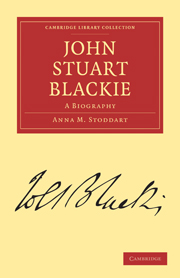Book contents
- Frontmatter
- PREFACE TO THE FIRST EDITION
- Contents
- CHAPTER I PARENTAGE AND CHILDHOOD. 1809–1819
- CHAPTER II AT SCHOOL AND COLLEGE. 1820–1829
- CHAPTER III STUDENT LIFE IN GÖTTINGEN. 1829
- CHAPTER IV STUDENT LIFE IN BERLIN. 1829–1830
- CHAPTER V ROME. 1830–1831
- CHAPTER VI END OF WANDERJAHRE. 1831–1832
- CHAPTER VII YEARS OF STRUGGLE. 1832–1837
- CHAPTER VIII THE TEST ACTS. 1837–1840
- CHAPTER IX INSTALLATION AND MARRIAGE. 1841–1842
- CHAPTER X ABERDEEN AND UNIVERSITY REFORM. 1842–1850
- CHAPTER XI ‘ÆSCHYLUS’ AND THE GREEK CHAIR. 1850–1852
- CHAPTER XII EDINBURGH. 1852–1857
- CHAPTER XIII LAYS, LECTURES, AND LYRICS. 1857–1860
- CHAPTER XIV HOMER. 1861–1866
- CHAPTER XV THE HIGHLANDS AND ISLANDS. 1866–1870
- CHAPTER XVI PILGRIM YEARS. 1870–1872
- CHAPTER XVII ‘SELF-CULTURE.’ 1873–1874
- CHAPTER XVIII THE CELTIC CHAIR. 1875–1876
- CHAPTER XIX EGYPT. 1876–1879
- CHAPTER XX RETIREMENT FROM THE GREEK CHAIR. 1880–1882
- CHAPTER XXI CLASS-ROOM AND PLATFORM. 1841–1882
- CHAPTER XXII RECREATIONS OF AN EMERITUS PROFESSOR. 1882–1887
- CHAPTER XXIII “LIVING GREEK.” 1888–1891
- CHAPTER XXIV CLOSING YEARS. 1892–1895
- INDEX
CHAPTER XIII - LAYS, LECTURES, AND LYRICS. 1857–1860
Published online by Cambridge University Press: 05 October 2010
- Frontmatter
- PREFACE TO THE FIRST EDITION
- Contents
- CHAPTER I PARENTAGE AND CHILDHOOD. 1809–1819
- CHAPTER II AT SCHOOL AND COLLEGE. 1820–1829
- CHAPTER III STUDENT LIFE IN GÖTTINGEN. 1829
- CHAPTER IV STUDENT LIFE IN BERLIN. 1829–1830
- CHAPTER V ROME. 1830–1831
- CHAPTER VI END OF WANDERJAHRE. 1831–1832
- CHAPTER VII YEARS OF STRUGGLE. 1832–1837
- CHAPTER VIII THE TEST ACTS. 1837–1840
- CHAPTER IX INSTALLATION AND MARRIAGE. 1841–1842
- CHAPTER X ABERDEEN AND UNIVERSITY REFORM. 1842–1850
- CHAPTER XI ‘ÆSCHYLUS’ AND THE GREEK CHAIR. 1850–1852
- CHAPTER XII EDINBURGH. 1852–1857
- CHAPTER XIII LAYS, LECTURES, AND LYRICS. 1857–1860
- CHAPTER XIV HOMER. 1861–1866
- CHAPTER XV THE HIGHLANDS AND ISLANDS. 1866–1870
- CHAPTER XVI PILGRIM YEARS. 1870–1872
- CHAPTER XVII ‘SELF-CULTURE.’ 1873–1874
- CHAPTER XVIII THE CELTIC CHAIR. 1875–1876
- CHAPTER XIX EGYPT. 1876–1879
- CHAPTER XX RETIREMENT FROM THE GREEK CHAIR. 1880–1882
- CHAPTER XXI CLASS-ROOM AND PLATFORM. 1841–1882
- CHAPTER XXII RECREATIONS OF AN EMERITUS PROFESSOR. 1882–1887
- CHAPTER XXIII “LIVING GREEK.” 1888–1891
- CHAPTER XXIV CLOSING YEARS. 1892–1895
- INDEX
Summary
The minstrel flame, which had nearly flickered out in Athens, blazed up again, fanned by airs from the western seas at Arran, and by pine-scented breezes at Braemar; and at the end of 1856 he completed a volume of original verse, called ‘Lays and Legends of Ancient Greece,’ and published by Messrs Blackwood & Sons. Although mainly concerned with the mythical and heroic stories of Greece, there were appended to these the “Braemar Ballads,” inspired by a summer sojourn there. Marching alone down the glens and up the mountains, his faculties quickened by movement in the fresh and heather-sweetened air, he covered much ground in his wanderings. As he walked he sang and shouted his lays into shape, aided rather than diverted by the shifting scenes of nature in her solitudes, or of peasant life and industry. For the first time he was brought face to face with deserted homesteads, with ruined hamlets, with patches—once kindly and provident—merging into the surrounding waste, with the wilding bushes from which the vanished hands had gathered fruits in their season, with all those relics of humble life which touch us with a pathos far nearer tears than do the crumbling towers of feudalism. They filled him with sympathy, and sent him straight to the study of that struggle, age after age, between peasant and proprietor. With characteristic energy he mastered its annals in the past, and made acquaintance with that old agrarian feud which separated into hostile camps the Plebeians and Patricians of Rome. His thoughts were soon articulate both in verse and prose.
- Type
- Chapter
- Information
- John Stuart BlackieA Biography, pp. 207 - 224Publisher: Cambridge University PressPrint publication year: 2010



